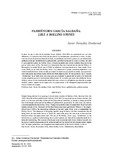Mostrar el registro sencillo del ítem
PARMÉNIDES GARCÍA SALDAÑA: LIKE A ROLLING STONES
PARMÉNIDES GARCÍA SALDAÑA: LIKE A ROLLING STONES
| dc.creator | González Gimbernat, Javier | |
| dc.date.accessioned | 2015-06-16T22:08:06Z | |
| dc.date.available | 2015-06-16T22:08:06Z | |
| dc.date.issued | 2013-01-09 00:00:00 | |
| dc.identifier.citation | http://revistas.ucr.ac.cr/index.php/filyling/article/view/6419 | |
| dc.identifier.issn | ||
| dc.identifier.uri | https://hdl.handle.net/10669/14479 | |
| dc.description.abstract | Despite being referred to in passing at almost every mention of Mexican Onda literature from the 1960s, the work of Parménides García Saldaña (1944-1982) has garnered scarce critical attention. His work, as is the case with other writers of the Onda literary movement, is notable as being one of the first to be deeply influenced by the effects of globalization; particularly by rock music and culture, and more specifically, the Rolling Stones. Though he has several literary models from which he draws loosely, notably Arthur Rimbaud and the Beat Generation (most specifically William S. Burroughs’ Naked Lunch (1959)), the overarching influence in his only novel, Pasto verde is undoubtedly the Rolling Stones. The references to the group, specific songs of theirs, and their iconoclastic way of being serve not only evoke the era in which the novel takes place, but also serve as key semantic elements within the experimental text. The use of the Rolling Stones song, “Satisfaction” in the text serves as a guide to understanding the narrator’s psyche and view of the subjective world he is textually constructing. The narrator, who shares many similarities with García Saldaña himself, can be read as a textual construction of the author himself and his view of his own chaotic reality: replete with the hopes, projections, and disappointments experienced by the García Saldaña in the era. | |
| dc.description.abstract | A pesar de que la obra de Parménides García Saldaña (1944-1982) es mencionada en casi cada referencia a la Literatura de la Onda de los años 60, ha recibido poca atención de la crítica. Su obra, como es el caso de otros escritores de la Onda, es notable por ser entre la primera en ser influenciada profundamente por los efectos de la globalización; particularmente por la música y cultura del rock y, más específicamente, los Rolling Stones. Aunque se puede notar varios modelos literarios de los que se nutre, como Arthur Rimbaud y la Generación Beat (en concreto los escritos de William S. Burroughs y su novela Naked Lunch (1959)), la influencia más prominente en su única novela, Pasto verde (1968), es sin duda los Rolling Stones. Las referencias al grupo, canciones específicas, y su modo iconoclasta de ser sirven no sólo para evocar la época en que se sitúa la novela, sino que sirven como elementos semánticos claves dentro del texto experimental. El uso particular de la canción “Satisfaction” en el texto sirve como una guía para entender la psiquis del narrador y la visión del mundo subjetivo que está construyendo textualmente. El narrador, que sirve como doble de García Saldaña mismo, es una construcción textual del autor mismo y la perspectiva que tiene de su propia realidad caótica: repleta de las esperanzas, las proyecciones y las decepiones experimentadas por García Saldaña en la época. | |
| dc.format.extent | - | |
| dc.relation.ispartof | Revista de Filología y Lingüística de la Universidad de Costa Rica Vol. 37 Núm. 2 | |
| dc.subject | garcía-parménides | |
| dc.subject | onda | |
| dc.subject | rock | |
| dc.subject | rolling stones | |
| dc.subject | globalización | |
| dc.subject | medios masivos | |
| dc.title | PARMÉNIDES GARCÍA SALDAÑA: LIKE A ROLLING STONES | |
| dc.title | PARMÉNIDES GARCÍA SALDAÑA: LIKE A ROLLING STONES | |
| dc.type | artículo original | |
| dc.date.updated | 2015-06-16T22:08:06Z | |
| dc.language.rfc3066 | es |
Ficheros en el ítem
Este ítem aparece en la(s) siguiente(s) colección(ones)
-
Volumen 37, Número 2 [13]


